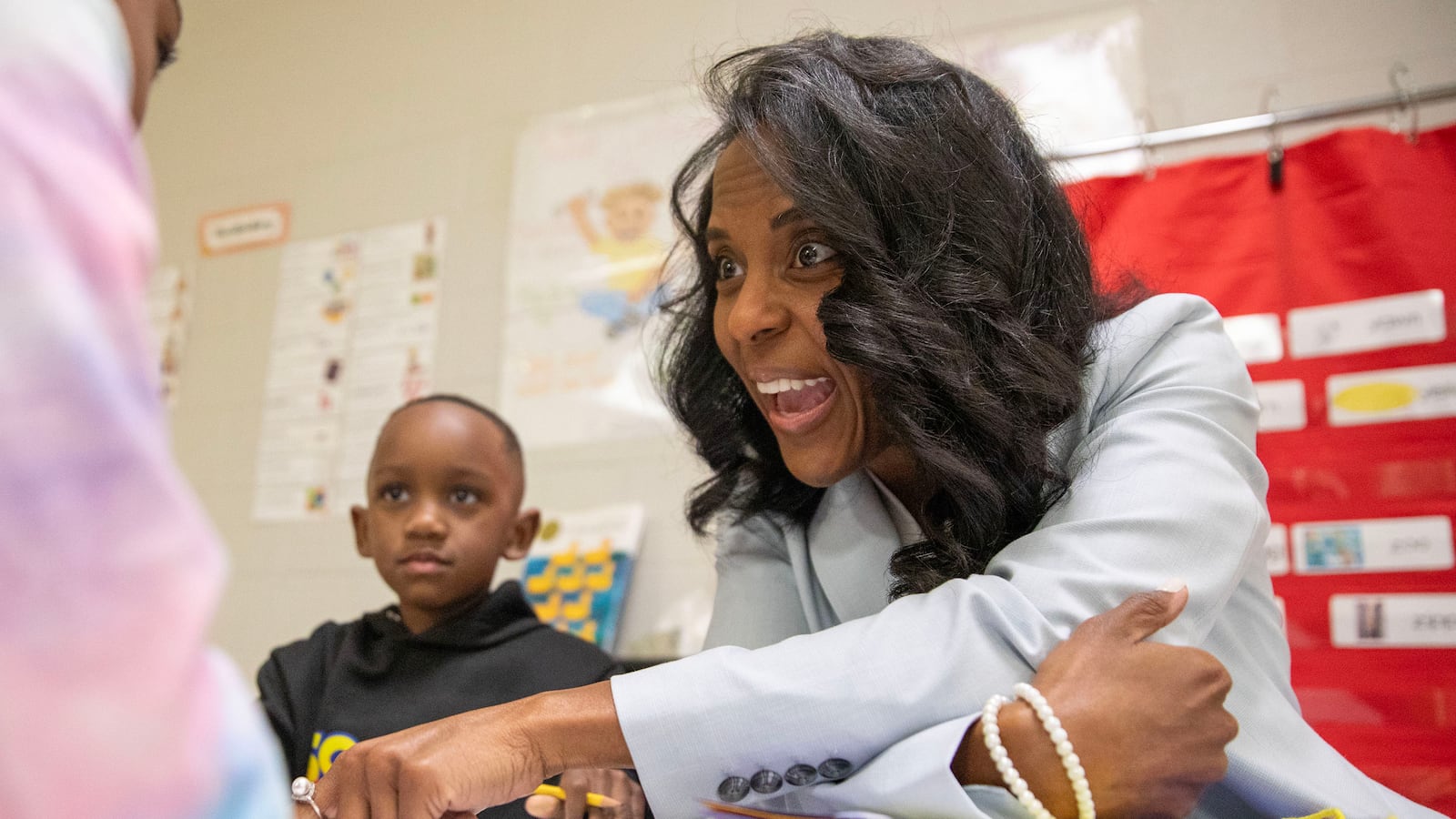Sign up for Chalkbeat Tennessee’s free daily newsletter to keep up with Memphis-Shelby County Schools and statewide education policy.
To dig in to her new job as superintendent of Memphis-Shelby County Schools, Marie Feagins took her seat at a desk.
Not her own desk at district headquarters, but a student desk in a classroom. She sat amid Northaven Elementary School students learning how to put together and define compound words like “horsefly” and “blackbird,” and later with Grandview Heights Middle School seventh graders solving math word problems about super-cold temperatures.
“I really want to see — and feel, more importantly — what the experience is like for you all,” she told a group of Grandview Heights students in April.
It wasn’t all just for the cameras. Feagins, 42 years old, came to Memphis having established a long record as an advocate for students, starting with an internship in Alabama serving youth entering the workforce and more recently as a top academic official in Detroit’s public school district working to boost high-school graduation rates.
She’s putting that record to the test in a district that needs to boost stagnating academic outcomes for students and restore the trust that has been eroded by scandals and school board discord.
Feagins has officially been superintendent for only about two months, but has been gearing up for this role for a long time. She published a doctoral dissertation in 2020 that examined challenges for Black women in getting hired and succeeding as superintendents. She secured her Tennessee teaching license before returning for the second round of interviews for the MSCS job, and arrived in Memphis within weeks after her selection, even before she had a final contract.
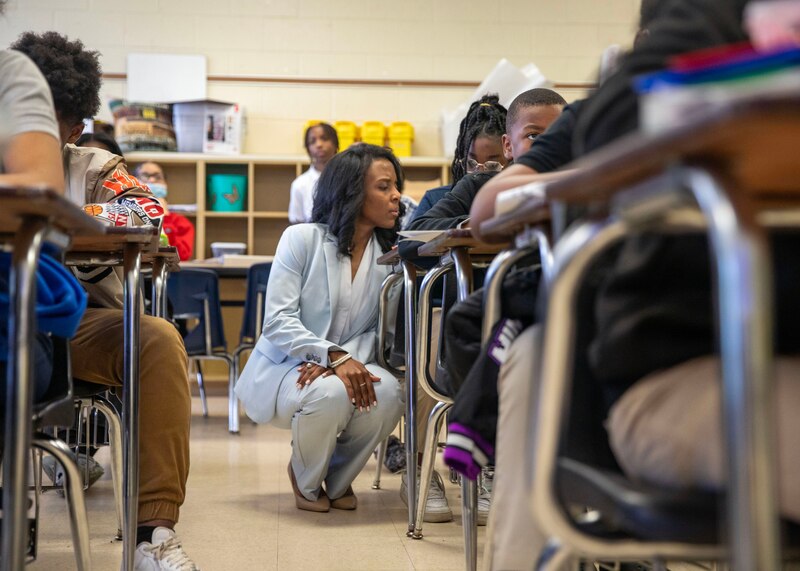
She began her official term with a nine-day school and community tour, seeking to build relationships and trust as the first outsider to run the merged district since it was formed a decade ago. She has chronicled her experiences in social media posts and comments, even responding to others’ posts about her.
She has called upon a team of current and former superintendents to guide her through the transition, and assembled a much larger group of local stakeholders to help develop a long-awaited strategic plan for the district. And she has a team of about 100 students advocating for their 100,000 classmates across the district.
Between her school visits, community meetings, and the early teambuilding, Memphians are beginning to learn more about how the new leader will exercise her power over Tennessee’s largest school district, how she will build bridges in a community where she has never worked before, and how she will turn research and vision into action and change.
Michelle McKissack, the school board member who nominated Feagins for the job, took early note of the new superintendent’s intensity.
“I felt that she captured having vision for this district, and for our children, and bringing people together. I think what she has already done in just a few weeks’ time, before she even started officially, that is exactly what I was looking for,” McKissack told Chalkbeat in early April.
Feagins is already being tested. She started three months earlier than the board initially planned. So her first month coincided with a last-minute announcement of a school closure and a contentious Tennessee legislative session that heaped new measures on Memphis. She’s shaking up top leadership with open applications for new job titles and is the face of hundreds of expected position cuts and realignments needed to reduce spending by $150 million.
Though Feagins has had some wins, such as increased teacher pay, building her own leadership team could be a chance to quell early concerns from some school board members that her leadership style was based more on theory than evidence. Her district administration experience is limited to a recent three years in Detroit, where she held four different roles.
Supporters from throughout her career said Feagins’ strengths are her communication and people skills. She celebrated her most recent birthday — her fifth day as superintendent — by organizing a Habitat for Humanity build with teams of student athletes.
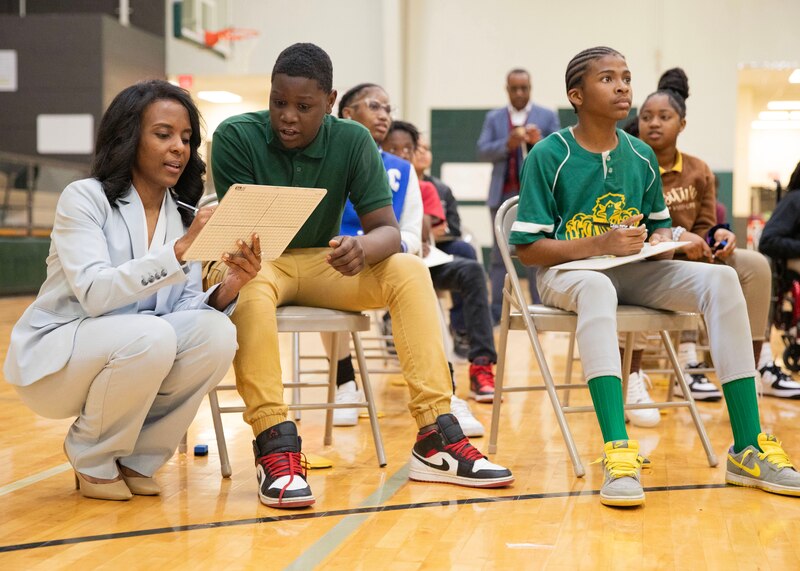
Feagins, who declined to speak with Chalkbeat for this story, has been open about wanting to be a superintendent. She applied for the Memphis role during the first search in 2023, and has pursued the top job before elsewhere. A previous job application impressed Michael Hinojosa, a former superintendent of nearly 30 years in Texas and Georgia who was part of the search team.
Feagins didn’t get an interview, but Hinojosa thought, “This lady is going places.” He kept her number, and is now leading a team of current and former superintendents, including Carol Johnson Dean, the former superintendent of Memphis City Schools — who are helping Feagins strategize her first moves.
For all her determination, Feagins didn’t always picture herself as a superintendent, she told an inquisitive Grandview Heights student during that April visit.
“I didn’t even know I could be a superintendent,” she said.
“Every superintendent I’ve ever had or seen has been a man, and a man that didn’t look like me,” she added. But she knew she wanted to be a leader, she told the students, and run a large organization. As superintendent, she said, she’ll mix the art of leadership with the art of teaching.
Feagins stood out as an advocate for students
Feagins, who graduated from the University of Alabama, began her career in the South, and has focused on education and related roles, except for brief stints in business and local journalism. The curated biography she shared notes that she once won a guest co-anchor position with Katie Couric, and has appeared in films including “Selma.”
One of her first jobs was with the youth services division of Birmingham, Alabama, working under another young leader, Cedric Sparks, who is now chief of staff for Mayor Randall Woodfin. She began as an intern, Sparks said, helping with programming for students entering the workforce. Creative and attentive, Feagins took direction well but also developed and implemented her own ideas advocating for students.
“You couldn’t put her in a box,” recalled Sparks, who has since received regular career updates from Feagins.
Sparks credits his own rise to someone seeing and nurturing his potential. Of Feagins, he said, “I would hope that they would give her the same grace.”
As her career advanced, Feagins kept up with her colleagues and mentors, and cited testimonials from dozens of them on a website she listed on her resume. Sparks was among them, as was Clarence Sutton, Jr., the longtime principal at Central High School in Tuscaloosa, which has struggled with academic performance and integration.
Sutton, now superintendent of Huntsville City Schools, remembers Feagins’ brief stint as a counselor for the way she could connect with each student, and expose them to new opportunities.
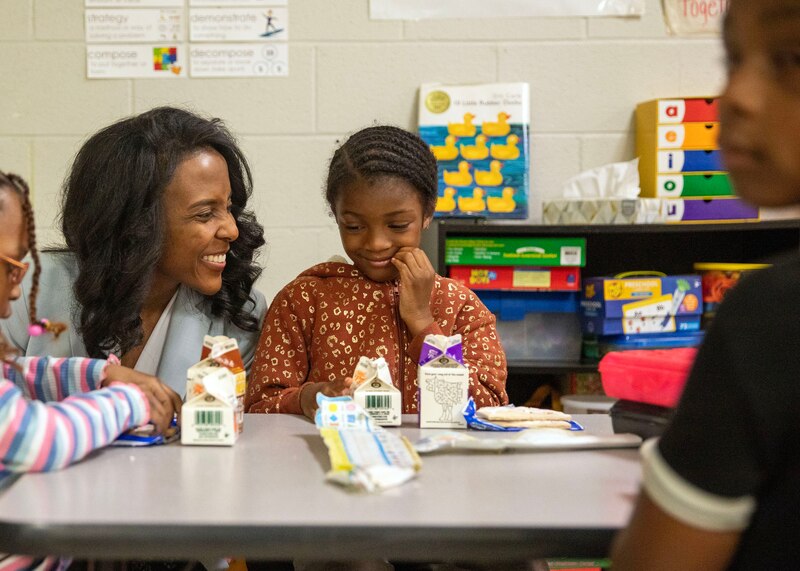
Feagins arrived in the Midwest in 2017 as an assistant principal at Cleveland’s John F. Kennedy PACT High School. The school’s students were predominantly Black and came from poor families, as with many Memphis schools, and its academic performance was among the lowest in Ohio, according to state data.
Aaron Talton, who was a student at JFK PACT at the time, recalls Feagins creating a stir at first with her Southern accent, bright clothing and smile, and establishing herself as an advocate for students.
Importantly, he said, she tried to fill in their gaps.
“She came and she dominated the place,” Talton said, describing a leader who “stood out in ways that were controversial” because people weren’t used to the type of accountability in leadership she displayed.
When students were banned from convening after school at the library in the shopping center around the corner, Feagins expanded tutoring hours after school, Talton said. She helped provide him a dress shirt and slacks, making him more comfortable in professional spaces.
Talton became a first-generation college student and graduated from Ohio’s Central State University.
During her February interview for the Memphis job, Feagins told board members about her efforts to increase parent engagement at JFK PACT High, by creating programs that translated education jargon to terms that families could better understand. Part of that was communicating data about the school’s failing letter grade.
Feagins took over as principal in 2019-20, the year interrupted by the start of the pandemic. Clarke Perkins, who was new to teaching and Cleveland then, remembers Feagins having to step into the principal role at the year-round school without much notice.
Feagins offered guidance, Perkins said, but didn’t lower expectations. She was the kind of leader who wanted to make change, despite systemic barriers facing the school. Together, they stayed late to wrap packages with sweatshirts for students. They organized Black History Month programming and a mock election.
“I’m telling you, she’s like superwoman,” said Perkins, who is now an attorney.
Feagins capped off her first year as principal with a drive-thru graduation. She was the last principal of the school before it closed and merged into a new building a mile away.
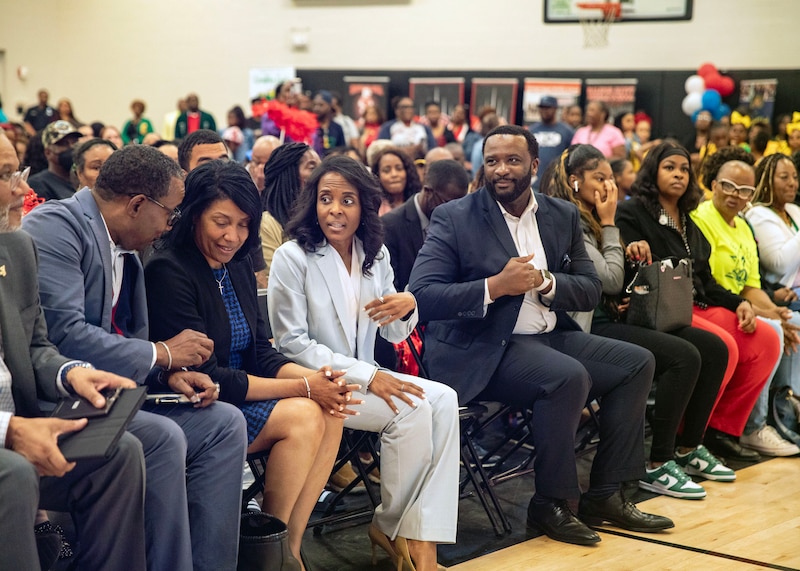
In Detroit, Feagins pushed for more students to graduate
By the next summer, she was in the Detroit public school district, where she spent nearly three years. Half of that time was in a role overseeing high schools and leadership, and the other half was split between three different roles, including as a special assistant to the superintendent.
During interviews with the Memphis school board, Feagins touted her work in Detroit to improve outcomes for high schoolers after the pandemic, especially graduation rates. Detroit’s efforts during that period included close monitoring of student progress and increased attention to credit recovery, where students who are not on track to graduate shift to make-up options for coursework.
The graduation rate, a four-year metric, began to bounce back and came to 74% for the 2022-23 school year. That was about a percentage point away from the pre-pandemic rate, and the first couple years of improvements that the district’s graduation rate had seen in years.
In a recommendation letter written in May 2022, Detroit Superintendent Nikolai Vitti praised Feagins for the “improved cohesion” she brought to those reforms.
Feagins began by sharing data with the principals, closely auditing student transcripts, and getting to know the specific stories about why schools were behind, so she could assign additional staff, she told Memphis board members. By tracking the data daily, Feagins said, she and school staff were able to make quick improvements to the number of students who were on track to graduate.
The most successful strategy, she told board members in February, was “operation graduation,” which included a final push to the finish line: Schools competed with one another to decrease the number of make-up courses students needed to be on track for graduation. They were celebrated with public recognition and a trophy, Feagins said. The winning school hosted a basketball game between teachers and staff, whose evaluations also included these high school success metrics.
“I did whatever we needed to do to make the work fun, because that’s not fun work,” Feagins told board members in February. “I also didn’t want kids to feel like because they were so far behind that it was impossible.”
The dropout rate declined in 2021-22, but increased to a recent high of 16% for the 2022-23 school year, Michigan data show.
Although the data on four-year graduation rates was promising, Chalkbeat Detroit reported in March 2023 that it came with costs. Credit recovery courses helped students get back on track to graduate. But because many were online, they could be disruptive to high school learning experiences. Students who transferred to other schools to focus on recovery courses missed out on clubs and other programs at their former schools.
Feagins appears poised to bring some of the Detroit strategies to Memphis, in hopes of boosting the district’s graduation rate from near 82%. She’s proposed $1.5 million in resources toward increasing the frequency of transcript audits, and adding staff who can focus on freshman and sophomore students at the district’s lowest performing high schools, and counselors who can help keep students on track.
“All of those (career) experiences have afforded me a pretty wide lens,” Feagins told reporters in May, “so that nothing really surprises me other than we’re not a little farther along than we are. And we’re not where I believe we should be.”
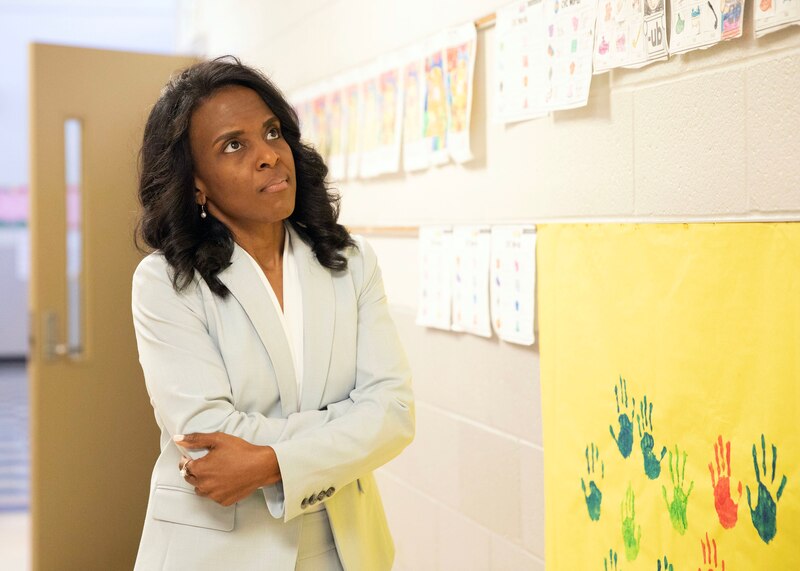
Feagins’ early steps aim to rebuild trust in MSCS
Feagins, though new to Memphis, knows about the importance of establishing trust — both among school board members and the community. She wrote about that in that doctoral dissertation, noting that lack of trust can prompt superintendent departures.
Already, Feagins has acknowledged that 10% of teacher positions are vacant, sharing a figure that the district historically has been reluctant to publicize. Transparency with the school board, Feagins found in her research, is one way to improve trust.
“People generally don’t care what’s on your resume, really,” said Johnson Dean, the former Memphis superintendent. “They care about how you interact with people and how responsive you are to their needs.”
The ability to reestablish trust in the school system was a consistent theme during Memphis’ tortuous search for a superintendent to replace Joris Ray, who resigned in 2022 amid an investigation and scandal.
Feagins, for her part, has sought to meet the challenge by keeping a full schedule of school tours and community meetings, and by surrounding herself with advisers who understand the city and the job.
And the community has responded to her openness.
“A change is gonna come,” a chorus of Melrose High School students sang to Feagins on the morning of April 1, her first day on the job.
The Orange Mound high school welcomed her with balloons and performances by the band and the cheer team, and other communities showed similar enthusiasm. Parking lots overflowed as school leaders and families showed up to see top students celebrated and hear from Feagins, who entered to a Tye Tribbett track proclaiming “new, new, new everything.”
“We wanted her to feel comfortable, like she’s at home, like she’s walking into her own school,” Melrose junior Rhyan Brown told Chalkbeat. His peers hope Feagins can keep alumni involved in the school, and find ways to more meaningfully address student behavior and bring more teachers to the school, rather than virtual teacher alternatives.
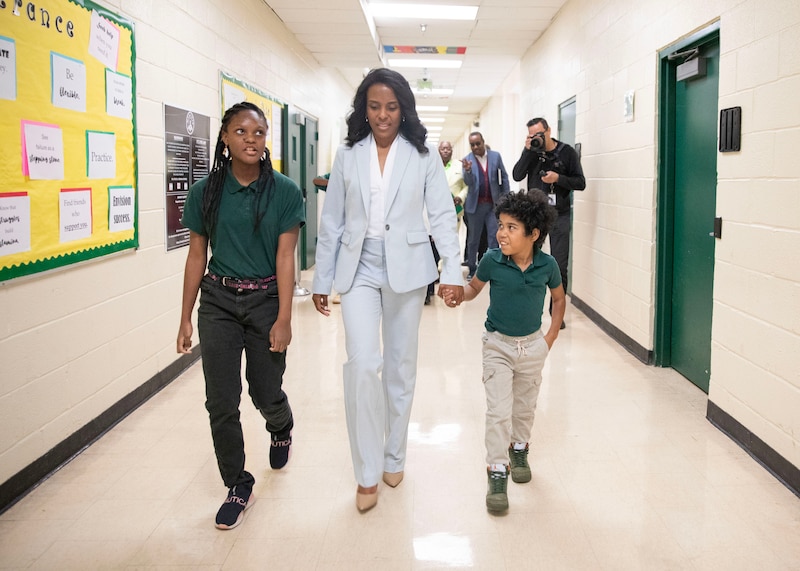
It’s early yet, but Feagins’ tenure so far has offered refreshing harmony among the superintendent, board, and community, said Venita Doggett, director of advocacy for the Memphis Education Fund. Doggett had closely scrutinized the superintendent search with requests for more transparency and authentic community engagement. Now she’s looking toward the team Feagins assembles to help her execute in the role.
Ultimately, Doggett said, how she assembles her cabinet and advisory teams “will tell us what her leadership looks like,” Doggett said. “Right now, she feels very inclusive.”
Laura Testino covers Memphis-Shelby County Schools for Chalkbeat Tennessee. Reach Laura at LTestino@chalkbeat.org.

